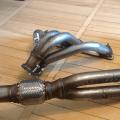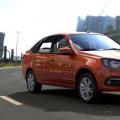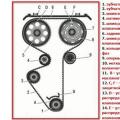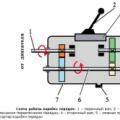4.04.2017
In 1996, the production of the car began Kia Sportage... At that time in lineup the brand did not have such cars, and the crossover market, in fact, did not exist. However, the company already clearly felt new trends that were beginning to influence automotive industry Europe and Asia. In connection with the rapid development of the global automotive industry, the high continuity of brands and the transition of cars to the wide mainstream, the demand conjuncture was changing, it became necessary to introduce a new type passenger carthat would satisfy previously seemingly incompatible requirements. Large and powerful four-wheel drive SUVs proved to be expensive to operate and maintain. Using them for personal purposes, especially in cities, turned out to be inconvenient. The class of sedans and station wagons, had limited capacity and cross-country ability in areas with imperfect road surface and variable weather conditions. Against this background, Kia specialists decided to take a part of the emerging and, as it turned out, very promising niche, creating a modern roomy car with good handling, comfort level, high ground clearance and, most importantly, all-wheel drive.
Kia sportage 2017 with all-wheel drive and diesel engine 2.0 CRDi
First generation
The first generation Kia Sportage was still influenced by the features that the SUVs of a more utilitarian class have, it retained the frame structure of the body, in its chassis and transmission some decisions were preserved that reminded of who was its predecessor. But something had to be done with the drive system. Permanent all-wheel drive to all four wheels was no longer a necessity for the Sportage, since the priority was not so much off-road capability, but the balance of capabilities, convenience and economy. Therefore, the crossover drive was implemented using the Part-time system. In this drive design, the rear axle is permanently connected, and the front axle can be connected temporarily if necessary. Kia Sportage 1 with this type all-wheel drive performed well on light off-road terrain, had low fuel consumption and decent handling despite the high ground clearance. Due to the rather soft suspension in the city, the crossover had a good level of comfort. The disadvantages include:
- Feature part-time systems - Do not drive on dry and hard surfaces in all-wheel drive mode;
- The low reliability of the front wheel hubs, they sometimes fail and front-wheel drive stops turning on;
- The need to connect front-wheel drive in manual mode;
- Lack of blockages, which reduces the vehicle's off-road capabilities;

Looking for a profitable and reliable way to buy a drive unit for Kia Sportage 3? If you choose our company as a supplier of auto parts, you can reliably and inexpensively service your vehicle... We offer a wide range of worthy products from trusted manufacturers and form profitable terms to purchase it.
ZMparts generates a product catalog in accordance with the latest developments and the achievements of this area, and therefore you can count on the most relevant ways to solve your transport problems... Our experts will inform you about technical characteristics the presented details and will help you decide on the most successful purchase option.
For all types car parts (drive for Kia Sportage 3 - including) quality certificates and coupons are provided warranty period service. Replacement and return of products takes place in accordance with applicable law.
Want to buy a low-cost drive for Kia Sportage 3? It's real with us!
Our company has managed to take a worthy position in the auto parts market due to a professional approach to business and an extremely harmonious ratio of quality and price indicators in the presented products. We work directly with manufacturers and are able to offer you the best value on the market. Look, contact the managers to discuss the details and place an order!
171 175 ..Kia Sportage 3. FRONT AND REAR WHEEL DRIVES
CONSTRUCTION FEATURES
Front-wheel drive front-wheel drive (Fig. 6.19) and all-wheel drive KIA Sportage III cars are almost identical in design. Only the drives of the right front wheel: on a four-wheel drive vehicle, the drive shaft 5 is shorter than the front-wheel drive version.
Figure: 6.19. Front wheel drives: A - right front wheel drive; B - drive of the left front wheel; 1 - outer hinge of the right front wheel drive; 2 - a large clamp for fastening the hinge cover; 3 - hinge cover; 4 - small clamp for fastening the hinge cover; 5 - front wheel drive shaft; b - dynamic dampers; 7 - inner hinge of the right front wheel drive; 8 - retaining rings of internal hinges; 9 - inner hinge of the left front wheel drive; 10 - the outer hinge of the drive of the left front wheel
WARNING
The front wheel drives of vehicles with manual and automatic transmissions, as well as front- and all-wheel drive vehicles, differ in length. For replacement, purchase exactly the same drive as on your car.
In addition, dynamic dampers 6 fixed with clamps are installed on the drive shaft of the right front wheel of a front-wheel drive vehicle.
Actuators rear wheels All-wheel drive vehicles KIA Sportage III are similar in design to front wheel drives and differ from them only in the length of the shafts and the absence of dynamic dampers. The rear wheel drive shafts are of the same length.
The drives consist of external 1 and 10, as well as internal 7 and 9 joints equal angular velocities (SHRUS), connected by shafts 5. The outer hinge provides the possibility of only angular movements of the connected shafts. The internal joint, in addition to the angular ones, makes possible axial displacements of the shafts when turning the front wheels and working the suspension.
The joints of all drives are the same in design and differ only in size.

The outer hinge of the Bearfield type consists of a housing 1, a cage 4, a cage 3 and six balls 2. In the hinge housing and in the cage, grooves are provided for
balls. The grooves in the longitudinal plane are made along the radius, which provides the required angle of rotation of the outer hinge. The splined tip of the outer hinge housing is installed in the front wheel hub and is attached to it with a nut.

The outer hinge yoke is mounted on the shaft splines between the thrust collar and the retaining ring.
The inner hinge of the Tripod type consists of a housing 1 and three rollers 2 on needle bearings fitted on the trunnions of a three-studded hub 3. In the hinge housing there are grooves for the rollers. The three-studded hub is fixed on the shaft by a retaining ring, the rollers allow the hub to move in the grooves of the hinge housing in the axial direction, so that the drive can be lengthened or shortened to compensate for mutual movements of the suspension and power unit... The splined tip of the inner hinge housing is fixed in the differential side gear (on four-wheel drive car the splined tip of the housing of the inner joint of the drive of the right front wheel is fixed in intermediate shaft transfer case) with a snap ring 8 (see.Fig. 6.19).
Balls of one sorting group are installed in the outer hinge. All parts of the hinge are selectively matched to each other, therefore, it is impossible to repair the hinge by replacing individual parts, and only the complete hinge is supplied to spare parts, as well as a small repair kit, which includes a retaining and thrust rings, a cover and clamps for fastening a cover and a dynamic damper.
The inner hinge is supplied as spare parts in the form of two repair kits: a large one, which includes all the hinge parts, and a small, similar to the repair kit, an outer hinge.
To lubricate the hinges, use a special grease with molybdenum disulfide (domestic analogue - SHRUS-4). The hinges are sealed rubber covers 3 (see.Fig. 6.19), fixed to the hinge bodies with clamps 2 and 4.
HELPFUL ADVICE
Drive hinges are very durable, their calculated resource is almost equal to the resource
In this article, I will briefly outline what most often breaks on kia car Sportage 3, model 2010-2016, factory designation Sl or Sle. I work at a service station and have practical experience in this matter. Here we will describe not only typical "diseases" of the sportage, but also methods of their treatment. The article is intended to save the owner of such a car from hours of searching for information in sections of automobile forums. It will also be useful for those who are just going to buy a used sportswear, because it is important to understand what to check when buying. If I suddenly missed something, write in the comments.
Four-wheel drive does not work!
A very common malfunction in the 3rd generation Sportage is a breakdown of the all-wheel drive system. It occurs even when the car is operated exclusively as an urban SUV, without using the all-wheel drive blocking function. After all, even if you do not press the 4WD lock button, the control unit automatically engages the rear axle at moments of sharp acceleration when starting off, or when the front wheels slip. The torque is constantly redistributed by the ITM unit between the front and rear wheels in a proportion from 100% - 0% to 50% - 50%, respectively.
There are two faults with all-wheel drive on the Sportage:
- breakage of the all-wheel drive coupling (PP);
- corrosion of the splined connection between the gearbox (gearbox) and the transfer case;
Moreover, the second malfunction occurs much more often than the first.
Malfunction of the PP clutch
All-wheel drive clutch, Sportage; 1 - clutch pack, 2 - pump
It manifests itself as follows: there is no connection of the rear wheels, even in 4WD lock mode (i.e. when the button is pressed), while the 4WD system malfunction lamp on the instrument panel is on. It's important that cardan shaft while rotating!
If in in general termsThe clutch is a conventional system with a multi-plate clutch that is compressed under oil pressure. The pressure is generated by a pump attached to the coupling housing.
Error codes "P1832 Clutch Thermal Overstress Shutdown" or "P1831 Clutch Thermal Overstress Warning" appear. Here is a detailed description of what exactly breaks down in this case and how you can repair it.
This happens especially often when the clutch overheats, with prolonged slip. Or with frequent use of 4WD lock mode. But this mode is intended only for short-term use in an area with difficult road conditions... Do not drive for a long time with the 4WD lock button pressed.
The problem is solved by replacing the PP clutch assembly. The part is not cheap, but there are firms that provide coupling repair services. These services are easy to find on the internet.
Another one possible breakdown - this is a malfunction of the clutch pump itself. In this case, error code P1822 or P1820 occurs. On this issue, KIA even issued a service bulletin, according to which of. the dealer must replace the clutch assembly.

If the car is not under warranty, you need to replace the pump separately, which will be much cheaper. Only new pump is already modified, and requires the purchase of wiring to it.
Part Numbers: 4WD Clutch Pump - 478103B520,pump wiring 478913B310
The price for a pump with wiring is approximately 22,000 rubles.
If you are buying a used Sportage, be sure to check the car for these problems. The repair is quite expensive, it consists of the prices for the differential parts (approx. 20,000 rubles) and the cost of the transfer case (600 USD, the price for a used one) and of course the work on removing the gearbox and replacing parts (up to 20,000 rubles).

List of necessary spare parts for repairing all-wheel drive on Sportage 3, with OE numbers
Do not turn on / hard to turn on the gear on a manual transmission, or extraneous noise
This disease begins to manifest itself with a characteristic noise from the gearbox, which is heard on a cold one, when the engine is running on idling... The service bulletin for this problem prescribes the replacement of the synchronizer rings for the 4th, 5th and 6th gears of the manual transmission.
Sometimes the reason may be in the "synchronization" of the 3rd gear and the corresponding gear. The reason is specifically determined after disassembling the box.
If the synchronizers are not replaced in time, more serious consequences may occur - the fur. damage to the teeth of gear wheels, which entails their replacement, and, consequently, more expensive repairs.
The cost of work usually costs up to $ 300. Plus the necessary spare parts.
The car does not go, a strong grinding in the area of \u200b\u200bthe right wheel, a malfunction of the intermediate shaft
The problem is similar to the one described above with four-wheel drive. Rotting out the spline connection between the right-hand drive shaft and the inner CV joint. This happens due to the ingress of water through the oil seal (or rather the boot). Further, the corrosion does its job, the slots weaken and completely cut off. When the splines of the flush are cut off completely, the car will be able to reach the service only when the all-wheel drive is on, because as a result of the differential operation, all the torque of the front axle will go to the right side.

Corrosion of the splines of the flush shaft and drive, right, Sportage 3
Repair price: ramval 4 500 rubles., CV joint right up to 45 000 rubles.
As in the case with the connection of the transfer case - the box, it is necessary to prevent the flushing with the replacement of the oil seal and the application of lubricant, this will prolong the life of the splines.
The engine does not develop more than 3000 rpm, the "CHECK" lamp is on or flashing
Of course, such symptoms are typical for many breakdowns. diesel cars... But here we are talking about the most frequent malfunctions, those that sooner or later happen on all Sportage.
This "disease" is typical for diesel configurations with R 2.0 and U2 1.7 engines. There are usually two reasons for these symptoms:
- malfunction of the boost pressure sensor, on a car with a 2-liter engine;
- malfunction of the boost pressure sensor wiring, on cars with a 1.7 engine;
In both cases, the control unit transfers the operation of the motor to emergency mode, which means, in particular, the cut-off of engine speed at around 3000 rpm. The driver gets the feeling that the turbine is simply not working. This is certainly not the case.
The Kia Sportage 3 crossover is sold in front-wheel drive and all-wheel drive versions. The plug-in all-wheel drive system can be equipped as vehicles with gasoline engineand diesel versions... The distribution of torque between the axles is controlled electronic unitlocated on the left side of the front panel under the cladding. It analyzes the following data: current engine load (position sensor throttle), the speed of the front and rear wheels, the angle of rotation of the wheels, information from the control unit anti-lock braking system... Connection rear drive carried out by electromagnetic clutchwhich is installed in front of the rear axle differential.
Total provided 2 operating modes of four-wheel drive: automatic and lock mode. In the first case, the connection rear axle occurs only when the ECU deems it necessary. Under normal conditions, the crossover will behave like a conventional front-wheel drive vehicle. Lock mode it is activated using a special button, which, depending on the modification, can be located either in the key block on the front panel to the left of the steering wheel, or on the central tunnel next to the gearbox control lever. After turning on the permanent all-wheel drive on dashboard lights up control lamp with orange light filter. Blocking mode assumes transmission to rear wheels up to 50% torque and active at speeds up to 40 km / h... Upon reaching a speed of 30 km / h, the rear axle is gradually disconnected and at a speed of 40 km / h it is completely disconnected. When the car decelerates, the reverse process occurs - in the range from 40 to 30 km / h, the torque transmitted to the rear axle gradually increases until fully connected. The blocking mode is deactivated by pressing the button again.
It is worth noting that on the dashboard next to control lampsignaling the transition to the mode forced blocking, there is a malfunction indicator in the four-wheel drive system. It starts blinking red when it detects any problem.
4WD system crossover kia Sportage 3 consists of the following main components: transfer case, propeller shaft and electromagnetic clutch... All of them are shown in the figure below.
Complete device kia drive Sportage 3
Transfer case attached to the transmission case. It has a fairly simple device and consists of a pair of bevel hypoid gears. Center differential there is no transfer case, and the function of distribution of the moment between the axles is performed electromagnetic clutchmounted together with the rear differential. It is on her input shaft rotation from transfer case through cardan shaft... In its turn the electronic unit control calculates the torque required to transfer to the rear wheels and, depending on this, blocks the clutch partially or completely.




